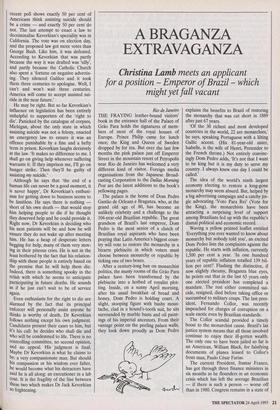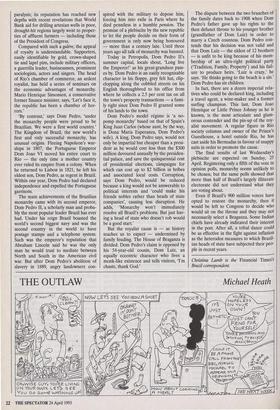A BRAGANZA EXTRAVAGANZA
Christina Lamb meets an applicant
for a position - Emperor of Brazil - which might yet fall vacant
Rio de Janeiro THE FRAYING leather-bound visitors' book in the entrance hall of the Palace of Grao Para holds the signatures of mem- bers of most of the royal houses of Europe. Prince Philip came for lunch once; the King and Queen of Sweden dropped by for tea. But over the last few months the pink palace just off Emperor Street in the mountain resort of Petropolis near Rio de Janeiro has welcomed a very different kind of visitor. Foreign media organisations from the Japanese Broad- casting Corporation to the Dallas Morning Post are the latest additions to the book's yellowing pages.
The palace is the home of Dom Pedro Gastao de Orleans e Braganza, who, at the grand old age of 80, has become an unlikely celebrity and a challenge to the 104-year-old Brazilian republic. The great grandson of Brazil's last emperor, Dom Pedro is the most senior of a clutch of Brazilian royal aspirants who have been praying that Latin America's biggest coun- try will vote to restore the monarchy in a bizarre plebiscite in which voters must choose between monarchy or republic by ticking one of two boxes.
After a century-long ban on monarchist politics, the musty rooms of the Grao Para palace have been transformed by the plebiscite into a hotbed of royalist plot- ting. Inside, on a sunny April morning, after his usual breakfast of bread and honey, Dom Pedro is holding court. A slight, stooping figure with bushy mous- tache, clad in a hound's-tooth suit, he sits surrounded by marble busts and oil paint- ings of his imperial ancestors. From their vantage point on the peeling palace walls, they look down proudly as Dom Pedro explains the benefits to Brazil of restoring the monarchy that was cut short in 1889 after just 67 years.
`Of the 30 richest and most developed countries in the world, 22 are monarchies,' he says, speaking Portuguese with a lilting Gallic accent. (His 81-year-old sister, Isabelle, is the wife of Henri, Pretender to the French throne.) Not entirely convinc- ingly Dom Pedro adds, 'It's not that I want to be king but it is my duty to serve my country. I always knew one day I could be called.'
The idea of the world's ninth largest economy electing to restore a long-gone monarchy may seem absurd. But, helped by a big advertising campaign and a catchy jin- gle advocating 'Vow Para Rei' (Vote for the King), the monarchists have been attracting a surprising level of support among Brazilians fed up with the republic's dismal political and economic record.
Waving a yellow printed leaflet entitled `Everything you ever wanted to know about monarchy but nobody told you', an excited Dom Pedro lists the complaints against the republic. He starts with inflation, currently 1,500 per cent a year. 'In one hundred years of republic inflation totalled 139 bil- lion per cent!' Flashing the distinctive, if now slightly rheumy, Braganza blue eyes, he points out that in the last 65 years only one elected president has completed a mandate. The rest either committed sui- cide, resigned, died before taking office or succumbed to military coups. The last pres- ident, Fernando Collor, was recently impeached for charges of corruption on a scale exotic even by Brazilian standards.
The Collor scandal provided a timely boost to the monarchist cause. Brazil's lax justice system means that all those involved continue to enjoy their ill-gotten wealth. The only one to have been jailed so far is an American, William Black, for falsifying documents of planes leased to Collor's front man, Paulo Cesar Farias.
The current President, Itamar Franco, has got through three finance ministers in six months as he flounders in an economic crisis which has left the average Brazilian — if there is such a person — worse off than in 1980. Congress remains in a state of paralysis; its reputation has reached new depths with recent revelations that World Bank aid for drilling artesian wells in poor, drought-hit regions largely went to proper- ties of affluent farmers — including those of the President of Congress.
Compared with such a galere, the appeal of royalty is understandable. Supporters, easily identifiable by gold, crown-shaped tie and lapel pins, include military officers, a guerrilla leader, businessmen, prominent sociologists, actors and singers. The head of Rio's chamber of commerce, an ardent royalist, has held a series of seminars on the economic advantages of monarchy. Mario Henrique Simonsen, a conservative former finance minister, says, 'Let's face it, the republic has been a chamber of hor- rors.'
`By contrast,' says Dom Pedro, 'under the monarchy people were proud to be Brazilian. We were a first world country.' The Kingdom of Brazil, the new world's first and only successful monarchy, has unusual origins. Fleeing Napoleon's war- ships in 1807, the Portuguese Emperor Dom Joao VI moved his entire court to Rio — the only time a mother country ever ruled its empire from a colony. When he returned to Lisbon in 1821, he left his eldest son, Dom Pedro, as regent in Brazil. Within one year, Dom Pedro had declared independence and expelled the Portuguese garrisons.
The main achievements of the Brazilian monarchy came with its second emperor, Dom Pedro II, a scholarly man and proba- bly the most popular leader Brazil has ever had. Under his reign Brazil boasted the world's second biggest navy and was the second country in the world to have postage stamps and a telephone system. Such was the emperor's reputation that Abraham Lincoln said he was the only man he would trust to mediate between North and South in the American civil war. But after Dom Pedro's abolition of slavery in 1889, angry landowners con- spired with the military to depose him, forcing him into exile in Paris where he died penniless in a humble pension. The promise of a plebiscite by the new republic to let the people decide on their form of government is only now being honoured — more than a century late. Until three years ago all talk of monarchy was banned.
Today in Petropolis, Dom Pedro II's summer capital, locals shout, 'Long live the Emperor!' as his great-grandson pass- es by. Dom Pedro is an easily recognisable character in his floppy, grey felt hat, clip- clopping along the cobbled streets on his English thoroughbred to his office from where he collects a 2.5 per cent tax on all the town's property transactions — a fami- ly right since Dom Pedro II granted some of his lands to the town.
Dom Pedro's model regime is 'a no- pomp monarchy' based on that of Spain's King Juan Carlos (whose aunt, by the way, is Dona Maria Esperanza, Dom Pedro's wife). A king, Dom Pedro says, would not only be impartial but cheaper than a presi- dent as he would cost less than the $300 million devoured annually by the presiden- tial palace, and save the quinquennial cost of presidential elections, campaigns for which can cost up to $2 billion in bribes and associated local costs. Corruption, says Dom Pedro, would be reduced because a king would not be answerable to political interests and 'could make his friends nobles rather than heads of state companies', causing less disruption. He adds, 'Monarchy won't immediately resolve all Brazil's problems. But just hav- ing a head of state who doesn't rob would be a good start.'
But the royalist cause is — as history teaches us to expect — undermined by family feuding. The House of Braganza is divided. Dom Pedro's claim is opposed by his 54-year-old cousin, Dom Luiz, an equally eccentric character who lives a monk-like existence and tells visitors, 'I'm chaste, thank God.' The dispute between the two branches of the family dates back to 1908 when Dom Pedro's father gave up his rights to the then defunct throne to his younger brother (grandfather of Dom Luiz) in order to marry a Czech countess. Dom Pedro con- tends that his decision was not valid and that Dom Luiz — the eldest of 12 brothers — is unfit to be king because of his mem- bership of an ultra-right political party (Tradition, Family, Property') and his fail- ure to produce heirs. 'Luiz is crazy,' he says. 'He thinks going to the beach is a sin.' Dom Pedro has six children.
In fact, there are a dozen imperial rela- tives who could be declared king, including a travel agent, a wine-maker and a former surfing champion. This last, Dom Joao Henrique or Little Prince Johnny as he is known, is the most articulate and glam- orous contender and the pin-up of the roy- alist movement. A regular figure in Rio society columns and owner of the Prince's Guesthouse, a hotel outside Rio, he has cast aside his Bermudas in favour of snappy suits in order to promote the cause.
The final results of last Wednesday's plebiscite are expected on Sunday, 25 April. Registering only a fifth of the vote in opinion polls, monarchy seems unlikely to be chosen, but the same polls showed that more than half of Brazil's largely illiterate electorate did not understand what they are voting about.
Even if Brazil's 900 million voters have opted to restore the monarchy, then it would be left to Congress to decide who would sit on the throne and they may not necessarily select a Braganza. Some Indian chiefs have already indicated their interest in the post. After all, a tribal dance could be as effective in the fight against inflation as the heterodox measures to which Brazil- ian heads of state have subjected their peo- ple in recent years.
Christina Lamb is the Financial Times's Brazil correspondent.



























































 Previous page
Previous page